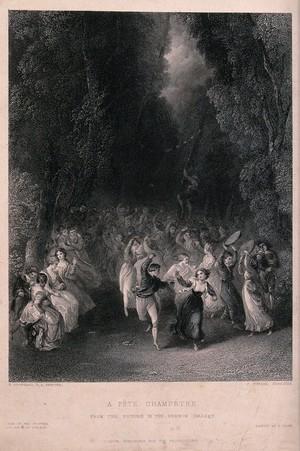‘Sociability and the Discourses of Nature in Eighteenth-Century Literature and Culture’, eds. Tymon Adamczewski, Jakub Lipski, Karl Wood, Literature & History, vol. 32, issue 2, Nov. 2023
Link to publication: https://journals.sagepub.com/toc/laha/32/2
Presentation of the special issue:
This special issue of Literature & History is concerned with how representations of sociability and sociable practices in eighteenth- century English literature were engaged with and informed by contemporaneous discourses of ‘nature’. […] Much critical attention has been given to indoor spaces of eighteenth-century sociability, from coffeehouses to literary salons, and recent collections of essays on sociable spaces, even if inclusive of approaches to the ‘natural’ environments of sociability, have also prioritised closed spaces. In an attempt to complement these latest perspectives, our rationale for the present collection is to foreground open environments of sociability, to study how sociable practices were conceptualised against what was traditionally understood as the ‘natural’ backdrop, and thus add to the critical work done on such outdoor spaces of eighteenth-century sociability as public gardens or the countryside. […]
The conceptual framework for the present collection is the intersection of eighteenth-century understandings of sociability as part of human nature and the various possibilities for sociable practices in ‘natural’ environments: parks, gardens, rural environs, spas, and more. At the same time, the binaries that have typically informed approaches to ‘human nature’ and ‘natural environments’, such as nature/culture, nature/civilisation, and naturalness/artifice appear to have been particularly unstable in the eighteenth century – much as they are these days, being critically re-evaluated in contemporary ecocritical studies. The quoted views by Addison and Locke, regarding ‘man’ as ‘naturally’ predisposed to sociable practices, were corrective of Thomas Hobbes, for instance, who claimed that humans are not ‘born fit for Society’ and become part of it ‘not by Nature, but by Education’. Such views, as we have seen, were later rearticulated by Rousseau. Accordingly, much of eighteenth-century literature conceptualised sociability as an art that should be taught and practised, with the art of conversation, for instance, being the subject of a number of treatises and conduct books in the period. Sociability was thus both felt to be part of one’s natural constitution – an impulse or a passion – and taught as a crucial element of teaching the cultivated manners and polite practices of the time. […]
The articles included in this issue are based on the papers given at a seminar organised at The National Archives, London, on 8 April 2022, as part of the international RISE-Horizon 2020 project DIGITENS (The Digital Encyclopaedia of European Sociability). They acknowledge the complexity of ‘nature’ as a subject of discursive practices and, rather than offering a falsely totalising perspective, prioritise their discreet areas of scholarly investigation, with special attention paid to how sociability was problematised with reference to the categories of human nature, gender, health, and the body. They also document how these categories ran parallel with the creation of a public sphere which, apart from allowing the circulation and debate of some of the core Enlightenment values (freedom and justice), gave rise to sociable practices rooted in and influenced by the physical environments in which they were taking place.20 In this sense, sociable practices, it is shown, were conceived of as driven by a set of familiar conceptual binaries, such as human/animal, naturalness/artifice, spontaneity/performance, solitude/company, as well as being inevitably conditioned by their changing environments. […]
- ‘Sociability and the Discourses of Nature in Eighteenth-Century Literature and Culture’, by Tymon Adamczewski, Jakub Lipski, Karl Wood
Link to article: https://repozytorium.ukw.edu.pl/handle/item/8111
- ‘From Buffon to Coleridge: Sociability and Humanity in Eighteenth- and Nineteenth-Century Comparative Anatomy’, by Kimberley Page-Jones
Link to article: https://hal.univ-brest.fr/hal-04315518v1
- ‘Escaping the Crowds: The Harmonious Environments of Sociability in Eighteenth-Century Writings’, by Przemysław Uściński
- ‘Frances Burney (Re)reads The Winter's Tale: Women's ‘Nature’ and Sociability in Evelina and The Woman-Hater’, by Anna Paluchowska-Messing
- ‘Satire and the Diffusion of Spa Culture in the Long Eighteenth Century’, by Karl Wood
Link to article: https://repozytorium.ukw.edu.pl/handle/item/8110

Other news
One-Day Conference: Les voyageurs européens et les lointains, perception(s), confrontation(s), représentation(s). 1600-1840
One-Day Conference Les voyageurs européens et les lointains, perception(s), confrontation(s), représentation(s). 1600-1840 14 June 2024 BnF, Site Richelieu, salle des conférences ...
CFP: Consentir, Refuser, Céder : Spectres de la Conquête à la Restauration (1660-1714)
Appel à contributions: Consentir, Refuser, Céder : Spectres de la Conquête à la Restauration (1660-1714) Colloque co-organisé IRCL (Université Paul-Valéry Montpellier 3) - LARCA (Université Paris C...
International Conference - ‘À table!’: Eating and Culinary Practices in the Literatures and Arts of the English-speaking World
International Conference - ‘À table!’: Eating and Culinary Practices in the Literatures and Arts of the English-speaking World 24-26 April 2024 Organised by VALE research unit (Sorbonne Universi...